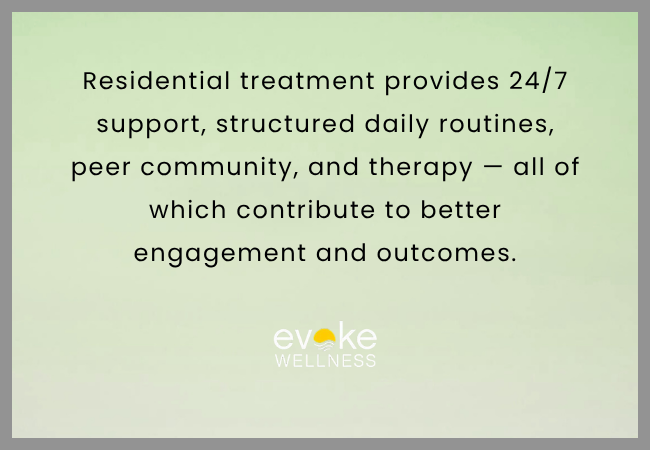Dual diagnosis is a term used to describe individuals who simultaneously experience a mental health disorder and a substance use disorder. This complex condition requires an integrative, intensive approach—one that many traditional outpatient programs simply cannot provide on their own. For individuals facing both mental illness and addiction, residential rehab offers the most comprehensive, immersive environment to initiate recovery and lay the foundation for lasting healing.
In this blog, we explore why residential rehab is often the best solution for dual diagnosis patients, how it supports simultaneous treatment of both conditions, and what sets this level of care apart.
Understanding Dual Diagnosis and Its Challenges
People living with dual diagnosis are not merely navigating the symptoms of one disorder; they’re contending with two interconnected illnesses that feed into each other. For example, someone struggling with depression may turn to alcohol for relief, only to find that substance use deepens their depressive episodes. On the other hand, individuals with anxiety disorders may rely on stimulants to feel in control, worsening their mental health in the long term.
One of the biggest obstacles for dual diagnosis patients is misdiagnosis. In many cases, the symptoms of substance use can mask or mimic psychiatric disorders, or vice versa. Without proper evaluation and integrated care, patients may receive treatment for only one part of the problem—leading to relapse, increased hospitalization, or continued emotional distress.
Effective treatment must address both the mental health condition and the substance use disorder simultaneously, in a safe and structured environment that allows for deep healing and continuous support. Residential rehab provides precisely that.
The Advantage of Structure and Stability
Unlike outpatient programs, where individuals return home each day after therapy, residential rehab removes patients from environments that may contribute to or trigger their substance use and emotional instability. A dual diagnosis patient might come from a chaotic home, lack proper support systems, or live in a setting that fuels their symptoms. Residential care offers round-the-clock stability and supervision, allowing the person to focus entirely on healing without the distractions and risks of the outside world.
A Residential Treatment Center in Massachusetts gives patients the opportunity to develop healthy routines, engage in structured therapy sessions, and receive daily clinical monitoring. This consistency is vital in stabilizing both mental health symptoms and addictive behaviors. It’s a place where boundaries are enforced, medication is managed safely, and support is constant.
Integrated Therapy Models for Dual Diagnosis
What sets residential rehab apart is the ability to provide fully integrated therapy for both mental health and substance use. This doesn’t mean simply treating two conditions in parallel—it means understanding the intricate relationship between the two and addressing them as parts of the same whole.
Dual diagnosis treatment in a residential setting often includes:
-
Psychiatric evaluation and medication management
-
Evidence-based therapies such as cognitive-behavioral therapy (CBT)
-
Trauma-informed care for underlying emotional pain
-
Group therapy to reduce isolation and foster peer support
-
Relapse prevention education tailored to co-occurring disorders
-
Family therapy to heal interpersonal dynamics and encourage support
These offerings allow individuals to explore how mental health struggles influence their substance use and vice versa. For example, CBT can help a person identify distorted thought patterns that lead to both depressive episodes and drug cravings. Understanding these links is essential in managing triggers and developing long-term coping mechanisms.
Access to Medical Detox and Mental Health Stabilization
A significant concern for individuals entering dual diagnosis treatment is withdrawal. Many people with substance use disorders require a safe detoxification process before starting therapeutic work. At Evoke Wellness at Cohasset, Medical Detox Programs in Massachusetts are offered as part of the continuum of care. This means individuals can begin their recovery in a medically supervised setting, where withdrawal symptoms are closely monitored and managed, minimizing physical discomfort and medical risks.
Simultaneously, mental health symptoms—whether it’s severe anxiety, depression, bipolar disorder, or PTSD—can be managed through proper medication, crisis intervention, and emotional support. The transition from detox into residential care is seamless, creating a safe bridge between physical stabilization and psychological healing.
Individualized Care for Complex Needs
No two dual diagnosis patients are alike. That’s why individualized treatment is a cornerstone of effective residential rehab. Upon admission, every patient receives a comprehensive assessment that explores medical history, psychiatric symptoms, substance use behaviors, trauma exposure, and family dynamics. This evaluation forms the foundation of a personalized treatment plan tailored to meet each patient’s needs.
A Mental Health Treatment Center in Massachusetts specializing in dual diagnosis offers a multidisciplinary approach. Teams typically include psychiatrists, licensed therapists, nurses, case managers, and recovery coaches—all working collaboratively to address each aspect of the patient’s well-being.
The ability to adjust treatment dynamically based on a patient’s progress or setbacks is another benefit of residential care. As individuals stabilize and gain insight into their conditions, treatment plans are refined to reflect new goals, whether it’s preparing for reintegration into work or school, learning to manage psychiatric symptoms, or strengthening communication skills in relationships.
A Community That Fosters Recovery
Dual diagnosis can be incredibly isolating. Many individuals feel misunderstood by their peers or ashamed of their struggles. Residential rehab creates a community where healing is shared, not hidden. Group therapy and shared activities cultivate peer support, empathy, and a sense of belonging.
Patients are encouraged to build connections, share their experiences, and learn from one another’s journeys. This camaraderie is often a turning point for individuals who’ve never felt seen or supported in their mental health and addiction challenges.
Moreover, the communal aspect of residential care reduces the shame often associated with relapse or mental health crises. Instead of judgment, patients find encouragement to get back on track and keep moving forward.
An Environment That Enhances Healing
The setting in which recovery takes place matters. A peaceful, comfortable, and supportive environment enhances emotional stability and encourages positive lifestyle changes. At Evoke Wellness at Cohasset, patients have access to amenities that elevate the treatment experience—making the process of recovery not just tolerable, but empowering.
As a Luxury Rehab Center Massachusetts, the facility provides high-end accommodations, private rooms, nutritious meals, and wellness activities that promote relaxation and mental clarity. This type of environment can be especially beneficial for dual diagnosis patients, who often feel emotionally fragile and physically exhausted when entering treatment.
Having access to quality surroundings affirms dignity, reduces stress, and increases engagement in therapy. Recovery isn’t only about overcoming addiction—it’s about reclaiming a quality of life that was once thought lost.
Why Choose Evoke Wellness?
Evoke Wellness at Cohasset stands apart as a leader in dual diagnosis treatment because of our deep commitment to individualized, integrated care. Our Dual Diagnosis Treatment in Massachusetts is built on compassion, clinical excellence, and evidence-based strategies that treat the whole person—not just the symptoms.
From the moment you walk through our doors, you’ll be met by a team that sees your potential, honors your story, and guides you every step of the way. We believe that healing happens through connection, and we are here to offer you a new beginning.
Conclusion
Recovery from dual diagnosis isn’t a linear path—it’s a journey of rediscovering balance, health, and purpose. For many, residential rehab is the ideal setting to take those first steps. It offers the security of medical oversight, the support of a therapeutic community, and the structure needed to break free from cycles of mental health struggles and substance use.
At Evoke Wellness at Cohasset, we are proud to be a trusted Intensive Inpatient Program in Massachusetts, offering expert care in an environment designed for lasting change. If you or someone you love is struggling with co-occurring disorders, call us today at 866-931-6429 to learn how we can help.
Frequently Asked Questions (FAQs)
What is a dual diagnosis in addiction treatment?
Dual diagnosis refers to the co-occurrence of a mental health disorder and a substance use disorder in the same individual, requiring integrated treatment for both conditions.
How does residential rehab support dual diagnosis recovery?
Residential rehab provides 24/7 care, structured therapy, medication management, and a stable environment—key components in treating both mental illness and addiction.
Is residential rehab better than outpatient for dual diagnosis?
For many dual diagnosis patients, residential rehab is more effective than outpatient care due to its intensive structure and continuous medical and therapeutic support.
What therapies are offered for dual diagnosis in residential treatment?
Programs typically include cognitive-behavioral therapy (CBT), group therapy, psychiatric care, trauma-informed therapy, and relapse prevention tailored to co-occurring conditions.
Who is a good candidate for residential rehab with dual diagnosis?
Individuals who struggle with both a mental health condition and substance use, especially those with a history of relapse or unstable home environments, are ideal candidates.





